GALLUP NEWS SERVICE
PRINCETON, NJ -- A recent USA Today/Gallup poll finds that the percentage of Americans who say that most members of Congress are corrupt has increased significantly from the beginning of this year, and is now at the point at which slightly fewer than half of Americans believe most members are corrupt. This is similar to what Gallup measured just prior to the 1994 elections. At the same time, relatively few Americans think their own member is corrupt. The American public is more likely to trust the Democrats in Congress -- rather than the Republicans -- to handle the issue of corruption, although the vast majority of Americans believe corruption in Washington involves both parties equally.
Corrupt Congress?
An April 28-30, 2006 USA Today/Gallup poll finds that Americans are divided as to whether most members of Congress are corrupt (47%) or not corrupt (46%). The percentage saying most members of Congress are corrupt is up significantly since January, when 38% said most members were corrupt and 55% said most were not. The current results are at roughly the same level Gallup measured in 1994, just before the Democrats lost their 40-year hold on party control of the House of Representatives.
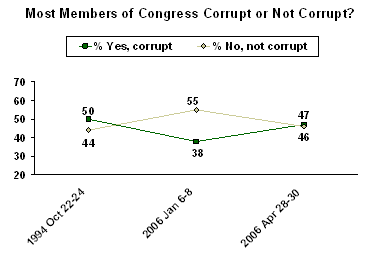
Still, Americans are much more positive in their assessment of their own member of Congress. Twenty-two percent of Americans say their own member of Congress is corrupt, while 67% say this person is not corrupt. These results have shown only modest fluctuation in the three times it has been asked.
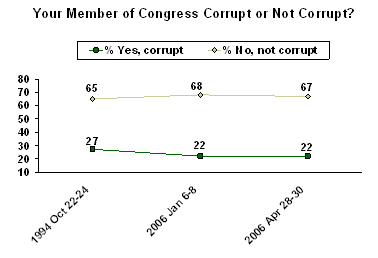
The poll finds that Democrats (including Democratic-leaning independents) are more likely than Republicans (including Republican-leaning independents) to say most members of Congress are corrupt. That would make sense, given that Republicans currently control both the House and Senate. There are only modest partisan differences about one's own member of Congress.
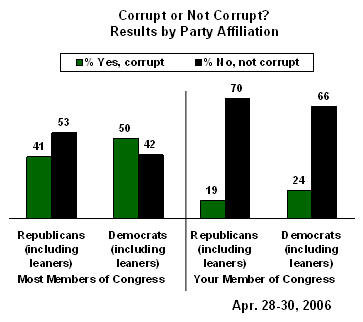
Half of Democrats (50%) say most Congressional members are corrupt, while 42% say most members are not. Among Republicans, essentially the opposite is true: 41% say most members are corrupt, while 53% say most are not corrupt.
Who Do Americans Trust to Handle Corruption in Government?
By a margin of 41% to 29%, a May 5-7, 2006 USA Today/Gallup poll finds that Americans say they trust the Democrats in Congress more than the Republicans to better handle the issue of corruption in government. Thirty percent of Americans volunteer that there is "no difference" between the parties or don't have an opinion on the issue. In the four times Gallup has asked this question since last October, Democrats have enjoyed about a 10-point advantage over Republicans.
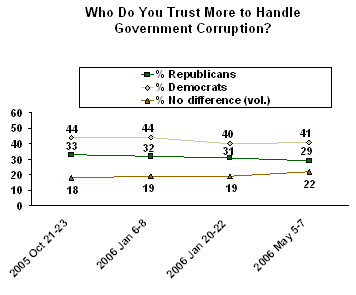
Seventy-five percent of Democrats say they trust the Democrats in Congress to handle the corruption issue, while 67% of Republicans say they trust the Republicans in Congress.
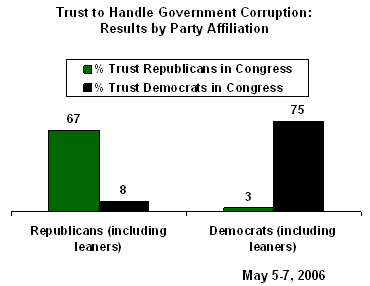
Are Republicans or Democrats More Involved in Corruption?
The May 5-7, 2006 poll also asked Americans their perceptions about whether the corruption scandals in Washington over the past year mostly involve the Republicans, the Democrats, or both parties equally. Seventy-six percent say it involves both parties equally, while 15% say the scandals mostly involve Republicans, and 5% say they mostly involve Democrats.
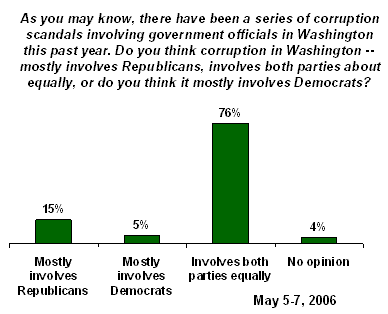
Democrats are much more likely than Republicans to say these corruption scandals involve members of their opposing party, though a strong majority of both partisan groups say the scandals involve both parties equally. One in four Democrats (26%) say the corruption issue mostly involves Republicans in Congress, while 1% says it mostly involves Democrats in Congress, and 69% say both equally. Among Republicans, 3% say the corruption cases mostly involve Republicans, while 12% say mostly Democrats, and 79% believe they are equally spread between the parties.
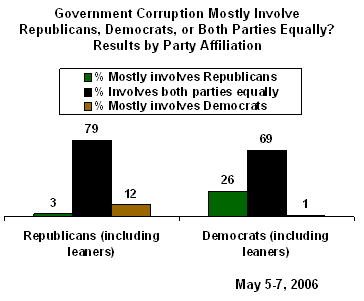
Survey Methods
Results are based on telephone interviews with 1,011 national adults, aged 18 and older, conducted April 28-30, 2006. For results based on the total sample of national adults, one can say with 95% confidence that the margin of sampling error is ±3 percentage points.
Results are based on telephone interviews with 1,013 national adults, aged 18 and older, conducted May 5-7, 2006. For results based on the total sample of national adults, one can say with 95% confidence that the margin of sampling error is ±3 percentage points.
For results based on the 492 national adults in the Form A half-sample and 521 national adults in the Form B half-sample, the maximum margins of sampling error are ±5 percentage points. In addition to sampling error, question wording and practical difficulties in conducting surveys can introduce error or bias into the findings of public opinion polls.
